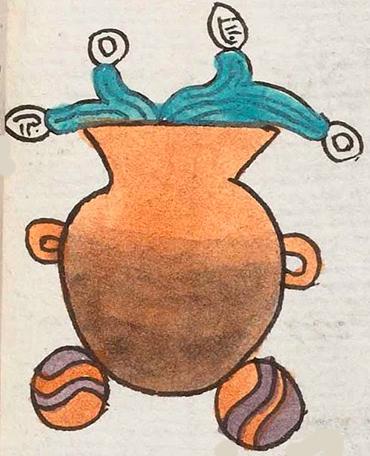Atotonilco (Mdz30r)
This simplex glyph for Atotonilco (perhaps "At the Hot Springs") doubles as the glyph for atotonilli (hot water). To express the concept of hot water, the glyph includes a ceramic pot (terracotta-colored) with a black (or gray) bottom. It sits on two stones (with the typical wavy lines of purple and orange or terracotta coloring), and water spills over the edges of the top of the pot. The water is a turquoise blue with lines of current and turbinate shells and droplets (or local jade beads) coming off the flow. The -co locative suffix, intentionally or not, can be conveyed by the ceramic pot (comitl).
Stephanie Wood
This simplex glyph could be considered a compound, given that it contains elements that are also glyphic in and of themselves--the stones (tetl, the water (atl), and the pot (comitl), with all their classic glyph-like characteristics. Atotonilco is likely a place with hot springs or thermal waters, having nothing to do with cooking, even if that visual is meant to bring forth the phonetic reading of hot water.
Pedro Carrasco (Estructura político-territorial del imperio tenochca, 2016) explains that this Atotonilco with the smaller glyph came to be called Atotonilco de Tula in Spanish, to distinguish it from Atotonilco El Grande (Hueiatotonilco).
Stephanie Wood
atotonilco. puo
Atotonilco, pueblo
Stephanie Wood
c. 1541, or by 1553 at the latest
Stephanie Wood
hot water, boiling water, pots, fires, water, shells, aguas termales, aguas calientes, fuegos, caracoles, agua hervida, nombres de lugares

a(tl), water, https://nahuatl.wired-humanities.org/content/atl
atotonil(li), hot water, https://nahuatl.wired-humanities.org/content/atotonilli
totonil(li), something heated, https://nahuatl.wired-humanities.org/content/totonilli
totonil(ia), to heat something, https://nahuatl.wired-humanities.org/content/totonilia
-co (locative suffix), https://nahuatl.wired-humanities.org/content/co
"Place of Hot Water" [Frances Karttunen, unpublished manuscript, used here with her permission.]
"On the Hot Water" (Berdan & Anawalt, vol. 1)This simplex glyph for Atotonilco doubles as the glyph for atotonil(li) (hot water). To express the concept of hot water, the glyph includes a ceramic pot (terracotta-colored) with a black bottom. It sits on tw
Codex Mendoza, folio 30 recto, https://digital.bodleian.ox.ac.uk/objects/2fea788e-2aa2-4f08-b6d9-648c00..., image 70 of 188.
The Bodleian Libraries, University of Oxford, hold the original manuscript, the MS. Arch. Selden. A. 1. This image is published here under the UK Creative Commons, “Attribution-NonCommercial-ShareAlike 3.0 License” (CC-BY-NC-SA 3.0).



